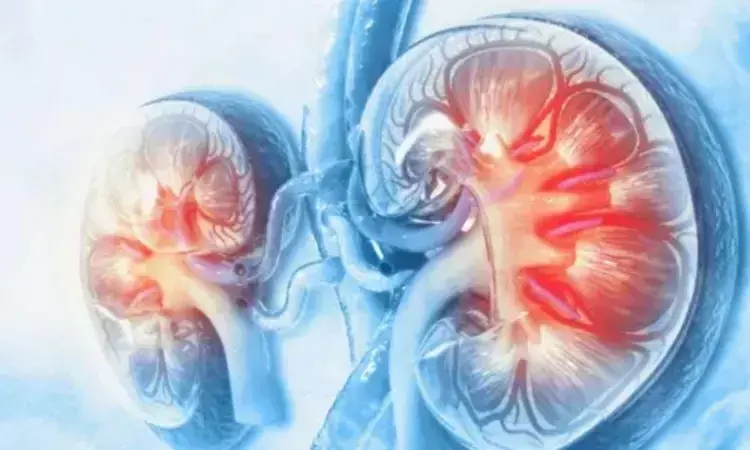- Home
- Medical news & Guidelines
- Anesthesiology
- Cardiology and CTVS
- Critical Care
- Dentistry
- Dermatology
- Diabetes and Endocrinology
- ENT
- Gastroenterology
- Medicine
- Nephrology
- Neurology
- Obstretics-Gynaecology
- Oncology
- Ophthalmology
- Orthopaedics
- Pediatrics-Neonatology
- Psychiatry
- Pulmonology
- Radiology
- Surgery
- Urology
- Laboratory Medicine
- Diet
- Nursing
- Paramedical
- Physiotherapy
- Health news
- Fact Check
- Bone Health Fact Check
- Brain Health Fact Check
- Cancer Related Fact Check
- Child Care Fact Check
- Dental and oral health fact check
- Diabetes and metabolic health fact check
- Diet and Nutrition Fact Check
- Eye and ENT Care Fact Check
- Fitness fact check
- Gut health fact check
- Heart health fact check
- Kidney health fact check
- Medical education fact check
- Men's health fact check
- Respiratory fact check
- Skin and hair care fact check
- Vaccine and Immunization fact check
- Women's health fact check
- AYUSH
- State News
- Andaman and Nicobar Islands
- Andhra Pradesh
- Arunachal Pradesh
- Assam
- Bihar
- Chandigarh
- Chattisgarh
- Dadra and Nagar Haveli
- Daman and Diu
- Delhi
- Goa
- Gujarat
- Haryana
- Himachal Pradesh
- Jammu & Kashmir
- Jharkhand
- Karnataka
- Kerala
- Ladakh
- Lakshadweep
- Madhya Pradesh
- Maharashtra
- Manipur
- Meghalaya
- Mizoram
- Nagaland
- Odisha
- Puducherry
- Punjab
- Rajasthan
- Sikkim
- Tamil Nadu
- Telangana
- Tripura
- Uttar Pradesh
- Uttrakhand
- West Bengal
- Medical Education
- Industry
Elevated serum lithium levels associated with future kidney risks including AKI

Discordant findings have long puzzled researchers exploring the nephrotoxic effects of lithium therapy among patients with bipolar disorder. However, a recent cohort study published in JAMA Network Open by Alessandro Bosi and team of researchers sheds new light on the topic, quantifying the absolute and relative risks of chronic kidney disease (CKD) progression and acute kidney injury (AKI) in individuals initiating lithium compared with valproate therapy. The study also investigates the association between cumulative lithium use, elevated lithium levels, and kidney outcomes.
The study, utilizing routine healthcare data from the Stockholm Creatinine Measurements project, included 10,946 patients who initiated therapy with lithium or valproate between 2007 and 2018. The median follow-up period was 4.5 years. Inverse probability of treatment weights was employed to minimize confounding factors.
● The findings revealed that patients receiving lithium therapy did not face an increased risk of CKD or AKI compared to those receiving valproate therapy.
● The hazard ratios (HR) for CKD and AKI were 1.11 (95% CI, 0.86-1.45) and 0.88 (95% CI, 0.70-1.10), respectively.
● The absolute 10-year CKD risks were low and similar between the lithium and valproate groups, at 8.4% and 8.2% respectively.
● There were no significant differences in the risk of developing albuminuria or the annual rate of decline in estimated glomerular filtration rate (eGFR) between the two therapy groups.
● However, the study did find an association between elevated serum lithium levels and adverse kidney outcomes.
● Out of over 35,000 routine lithium tests, only 3% of results exceeded the toxic range (>1.0 mmol/L).
● Serum lithium levels greater than 1.0 mmol/L were linked to an increased risk of CKD progression (HR, 2.86; 95% CI, 0.97-8.45) and AKI (HR, 3.51; 95% CI, 1.41-8.76).
The study highlights the importance of close monitoring and dose adjustment for patients receiving lithium therapy. While the new use of lithium was not associated with significantly higher risks of CKD or AKI compared to valproate therapy, elevated serum lithium levels were found to be a risk factor for kidney complications.
These findings provide valuable insights for healthcare professionals managing bipolar disorder patients receiving lithium therapy. The results emphasize the need for diligent monitoring of serum lithium levels to ensure they remain within the therapeutic range and to minimize the risk of adverse kidney outcomes. Further research is warranted to gain a comprehensive understanding of the relationship between lithium therapy and kidney function in bipolar disorder patients.
Reference:
Bosi, A., Clase, C. M., Ceriani, L., Sjölander, A., Fu, E. L., Runesson, B., Chang, Z., Landén, M., Bellocco, R., Elinder, C.-G., & Carrero, J. J. (2023). Absolute and relative risks of kidney outcomes associated with lithium vs valproate use in Sweden. JAMA Network Open, 6(7), e2322056. https://doi.org/10.1001/jamanetworkopen.2023.22056
Dr Kamal Kant Kohli-MBBS, DTCD- a chest specialist with more than 30 years of practice and a flair for writing clinical articles, Dr Kamal Kant Kohli joined Medical Dialogues as a Chief Editor of Medical News. Besides writing articles, as an editor, he proofreads and verifies all the medical content published on Medical Dialogues including those coming from journals, studies,medical conferences,guidelines etc. Email: drkohli@medicaldialogues.in. Contact no. 011-43720751


